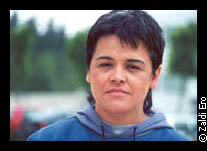
 |
|
%100
basque
Susa, 2001 Novel 232 pages. ISBN: 84-95511-41-X Available rigths: Free for all languages |
 |
Itxaro Borda
is
one of the most critical voices in Basque literature today, one who often
uses her literary work to denounce the cultural, political, and economic
deprivation in the northern Basque Country. Criticism has been a constant
in Borda'a work. Her previous poetry and novels offer a precise commentary
on the abandonment of ethnic minorities within the French state. Her critique
usually appears in the background, intermingled with the events in the
story she is narrating or the feelings she wants to express. %100 basque,
however, brings the criticism to the forefront and moves the narration
of events to a secondary plane.
Nevertheless, Borda wants to make clear that hers is a work
of fiction by immersing her text within the Western literary tradition.
The book begins with a referente to Marcel Proust, and, in the same way
as the French author, Borda uses food to recall the past. Cheese, in this
case, becomes the means by which the author explores the meaning of being
Basque. The title of the book, %100 basque, refers to an advertisement
that claims that their product, sheep cheese, is pure Basque. Borda reflects
on the wide acceptance and praise of Basque cheese the —"white gold,"
as she calls it— and ironically contrasts its popularity with the
rejection that Basques suffer otherwise. In a satiric manner, cheese,
sheep, and shepherds become the symbol of what it is to be a "real" Basque
and, as such, they are the instruments of Borda's critique.
The book is divided into a large number of entries separated
by a these-to-four-line pseudo-philosophical maxim en how to find one's
own path in lífe. Next, we find the stories, all of which follow
the same model: after wandering the roads late at night the narrator arrives
home with the sole idea of having some cheese to calm her mind and soul.
Reflecting en things she sees while driving or triggered by elements in
the world of cheese, the narrator starts her criticism. First, she reproaches
the attitude of these Basques who pretend te love the Basque language,
euskera, but teach French to their children. Next, she blames Basque
cultural institutions that maintain their culture in a primitive state
and deny it any contemporary or future significante. Finally, she attacks
the political and economic powers in the region because they use Basque
culture to satisfy their own personal interests. In short, Borda denounces
the hypocrisy that surrounds Basque culture.
Irony permeates the book. The introductory aphorisms contradict
the stories they supposedly illustrate: her anecdotes show that in order
to be authentic, Basques act like sheep. That is, in order to remain pure,
Basques follow their cultural, political, and economic leaders when in
fact these leaders have other interests in mínd. The aphorisms,
however, predícate the opposite: they show the need to find one's
own path. Exposing her readers to this contradiction lies at the heart
of Itxaro Borda's %100 basque. Maite
Nuñez-Betelu University
of Missouri, St. Louis |